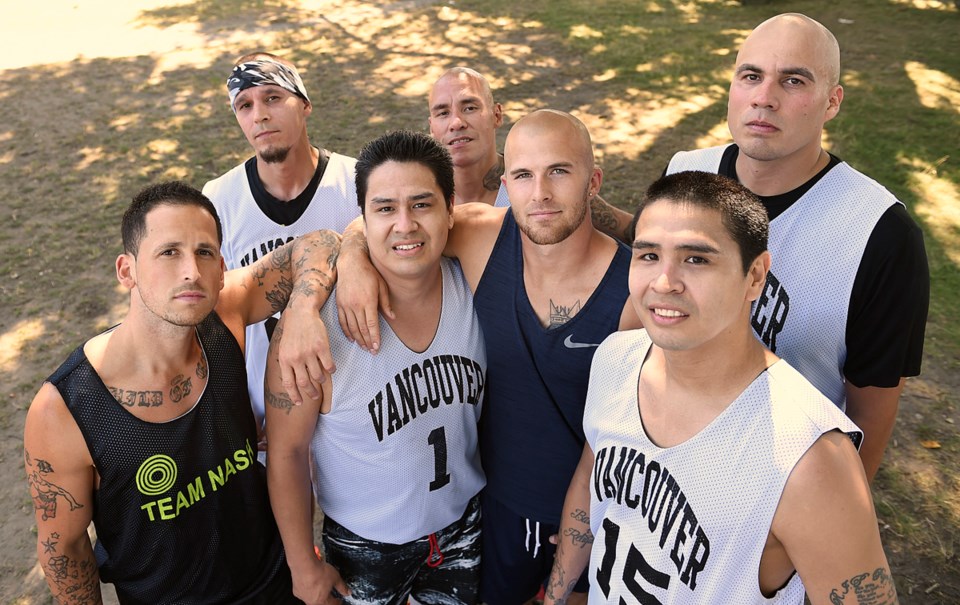Murders, premature deaths, life-altering injuries, losing friends en masse — Gene Wolff has fit a lifetime of pain into three-and-a-half decades.
But each time the world chipped away at him, the 35-year-old Â鶹´«Ă˝Ół»resident turned to hardwood, blacktop and leather to see him through.
A former standout in the collegiate circuit both in the U.S. and Canada, Wolff is now at the helm of Team Vancouver’s entry at this week’s inaugural Haico World Indigenous International Basketball Challenge.
The tournament features teams from Zambia, Zimbabwe, China, South Sudan, New Zealand and aboriginal clubs from across North America. Hosted at Simon Fraser University from Aug. 10 to 13, the first-of-its-kind gathering is a celebration of indigenous cultures from across the globe.
More importantly, it’s a celebration of how sport can bring a person, or an entire nation, back from the brink.
“Dealing with death has been a battle throughout my whole life — it seems to be a constant factor in everything I’ve dealt with,” said Wolff, whose mom died when he was 17. “Going through what I went through, it seemed like nothing would ever go my way with regards to family, friends and some of my closest friends dying. You get depressed and things go dark. Basketball seemed to be the only place I could go to.”
Wolff was on his way to making a major name for himself in basketball circles by the age of 17, though a serious knee injury required complete reconstructive surgery and months on the shelf.
Shortly after the rehab process was complete, his mother died. Over the years, he estimates he’s lost 15 friends: some were murdered, others succumbed to substance abuse. He, too, battled his demons.
“Because I was winning all the time, I was celebrating,” he said. “I wasn’t a massive alcoholic but I was a weekend warrior. It was tough, man. Now I’m an amazing father. I don’t do drugs or alcohol. Basketball saved my life.”
The parallels between Wolff’s journey mirrors those who are travelling thousands of kilometres to participate in this week’s tournament: genocide in South Sudan, political unrest in other parts of the African continent and widening class disparities in China.
Fostering a kinship through sport and bonding over shared hardships will be front and centre at the event, according to tournament co-organizer David Wahl, who spoke to the Courier from his home in the small Haida Gwaii town of Tlell.
Wahl is coach of the Skidegate Saints, one the teams participating in the tournament that’s made up entirely of players belonging to the Haida First Nation.
“I know there’ll be a real sense of sharing, getting to know one another and camaraderie,” he said. “I think the informal events away from the basketball court will likely end up being the most meaningful part of the tournament.”
As part of the Aug. 10 opening ceremonies, a welcoming prayer was to be recited by a Haida chief. The closing ceremonies, on the other hand, will feature performances by Haida members, a presentation led by the South Sudanese contingent honouring all 65 indigenous tribes native to that country and a rendition of the haka — a traditional Maori war cry or dance — led by Team Maori.
“When would you ever have the Haida Nation, the Maori and south Sudanese doing a cultural performance together?” Wahl said. “And that’s not even including the other nations that will be sharing their experiences with us.”Ěý
Wahl’s team has helped organize the long-running All-Native Basketball Tournament hosted in Prince Rupert each year. In 2015, the Saints travelled to New Zealand to play Maori clubs, and the expectation was that the New Zealanders would come to Haida Gwaii this year to complete the home-and-home set. But while down south, the Maoris spoke to their experiences playing other indigenous teams from Tonga and Australia and the idea was hatched: rather than simply having a Haida-versus-Maori tournament, invitations were sent across the planet.
More than 100 teams expressed interest, though the final numbers were pared to 16 teams who’ll play four games each before entering the qualifying and knock-out stages.
But for all the feel-good brotherhood that’s anticipated, sport remains sport, and competitive juices are sure to simmer.
“This is a great opportunity to network and be able to set up communications and relationships with people so we can travel the world,” Wolff said. “But I’ve been playing with professional athletes my whole life and competing at a super high level, so it ain’t no thing. I want to win this bloody thing. I don’t like losing. I’m a winner. I love winning. If I lose I lose, but the goal is to win.”
For more information on the tournament, go to facebook.com/IndigenousBasketball2016.
@JohnKurucz



